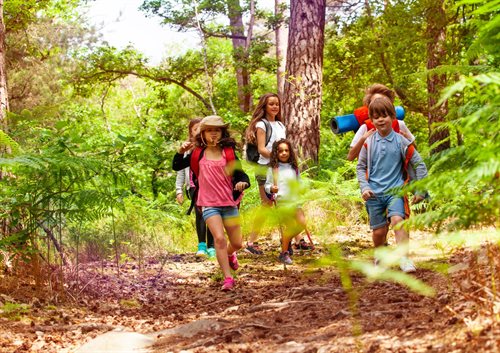Things to consider when organing Forest School activities
Forest School activities and enjoying the great outdoors can be a wonderful learning experience for children. They can also have some inherent risk of illness and injury, but these can be easily managed to minimise potential harm.
Activities aimed at nursery and primary school children actively encourages hands-on contact with mud, mud kitchens, water, plants, animals and other living things found in the natural environment.
animals and other living things found in the natural environment.
Some common risks of Forest School activities to consider include exposure to:
- Allergens such as hay fever and plant allergies;
- Infectious diseases such as E.coli O157, Cryptosporidium and Lyme’s diseasethat naturally exist in the outdoor environment;
- Insect bites and stings from wasps, bees and ants;
- Weather-related illnesses – heatstroke, sun burn, dehydration, hypothermia; &
- Injuries – cuts, scrapes, slips and trips.
Here’s some useful tips to help you enjoy outdoor nature safely:
-
Carry out a written risk assessment of Forest School activities and review the area being used so that all potential risks are considered before venturing outdoors.
-
Ensure staff complete basic first aid and forest school training courses and have access to a first aid kit and any medication needed by staff or pupils. E.g. allergic reactions to stings and bites.
-
Ensure staff and children wear suitable clothing and footwear for the weather conditions.
-
Check that any tools and equipment are suitable for use, in good repair and good working order and children are supervised closely.
-
Teach children about safely interacting with plants, insects and animals and the potential risks associated with them e.g. possibly poisonous and can bite and sting.
At beginning of each session remind pupils of these safety rules:
-
No eating of food or snacks during forest school activities.
-
No picking or eating any plants. Educate children on “No pick, no lick” rule.
-
No wandering off into unsupervised or prohibited areas e.g. ponds, manure heaps.
-
No sucking of fingers and avoid putting hands, pens, pencils or crayons etc. into mouths.
- No running and to move carefully around outdoors, especially if carrying tools, sticks or branches.
Remember hand washing at key points:
Hand washing is key to protecting pupils, staff and others from germs and illness. Pupils should be supervised washing hands especially:
especially:
- After activities involving mud/digging/mini beast hunts;
- Before leaving the forest school area if possible;
- After taking off outdoor clothing and footwear;
- Before preparing and eating food;
- After using the toilet;
Hand sanitiser should not be used as an alternative to hand washing with soap and water.
Hand sanitiser will not effectively kill all germs.
What to do if you or any of your party become ill after forest school activities?
If a member of your group shows signs of illness (e.g. prolonged sickness or diarrhoea) after forest school activities, advise them or their parent/guardian to visit their doctor for further advice and they should remain off school until they have been at least 48 hours symptom free.
Useful resources: